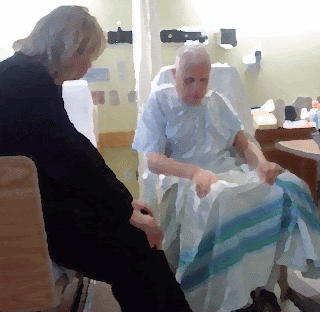(photo filtered by the author)
Memories of the War
On Monday I was in my father-in-law’s room at the Neurological Institute in Montreal, listening to him tell my wife, slowly, with two words or three when he could muster the breath, about the dates that his own father spent in concentration camps during the war.
Sometime in early 1942, a Slovenian partisan shot and killed an Italian officer near my father-in-law’s village, Podmelec. In retaliation, the Italians rounded up all the men there as well as the men from two neighboring villages, Sela and Borovnica, and sent them to a holding camp near Genoa, in a place called Cairo Montenotte. When Mussolini’s government began to collapse and the Germans took control of Italy, they shipped all prisoners to their death camps.
The 300 Slovenians from my father-in-law’s village and the neighboring ones were sent to Mauthausen in December of 1943. It was only three months they spent there before someone in the Italian ministry in February of 1944 interceded with the German authorities and said the Slovenian prisoners had been sent there by mistake.
By then, only two of the men were still alive, my wife’s grandfather… and the village cobbler. She said he never spoke of the experience to her, but once, when her father as a boy asked his father about the scars on either side of his head, he told him it was from beatings he sustained when going up for seconds whenever food was served. It was the only way he stayed alive. The people killed soonest, he said, were the ones who spoke up for their rights or complained.
My father-in-law, even in his weakened condition (he suffers from normal pressure hydrocephalus, which has robbed him of the ability to walk and speak for very long), is not a small man: six-foot-four, and he told me his own father was even bigger.
Which gives you an idea of just how brutal the camps must’ve been.

